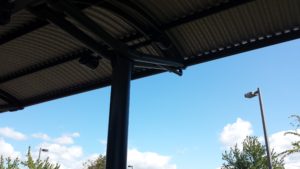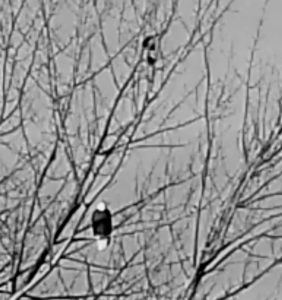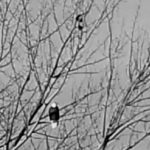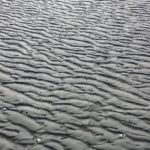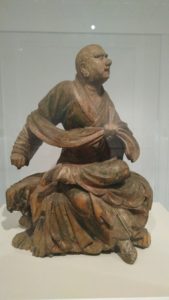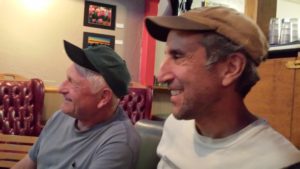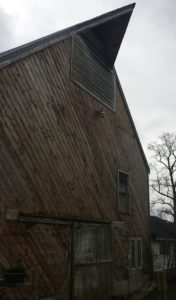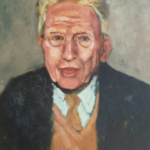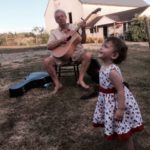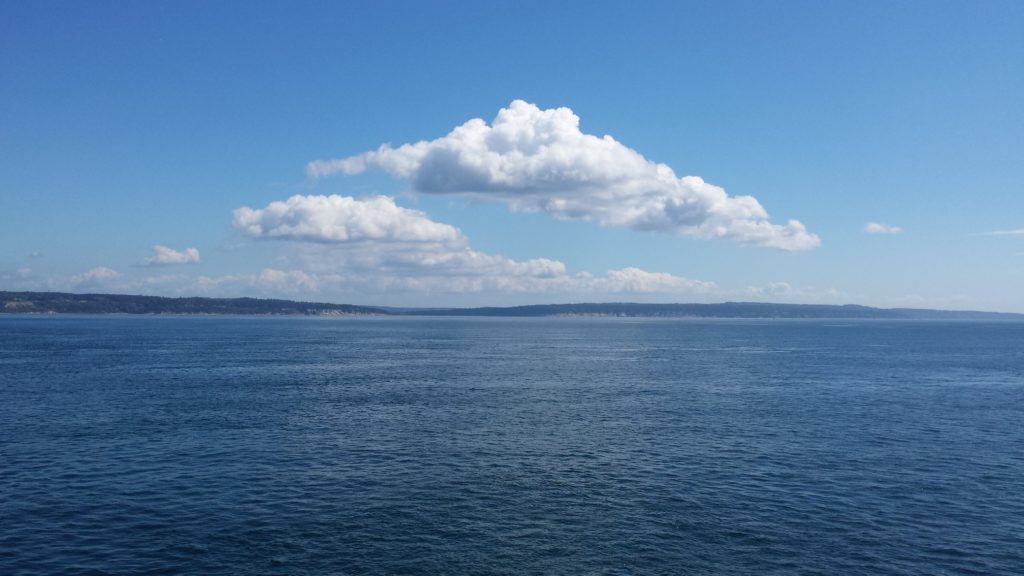Lying in bed, deliberately sleepless, waiting to make sure there is no sound at all. For the first time, the presence in the room of vestigial objects from childhood feels slightly distasteful.
Listening. Feeling the mood of the night. No coughing. No quiet movement. The screen already removed and put in the closet earlier when any noise was covered by kitchen clean up. Is the opening in the old casement window big enough? Unused to lying awake, all sounds are magnified in the night.
Finally, there is complete quiet. No birds. No crickets. Perhaps slight snoring from the other end of the house, but how could it really be heard?
She pulls back the sheet, quietly puts one foot then another on the floor, bends down to slide the small pack from under the bed and, with the help of a stool she had secreted in from the laundry room, she throws the bag out onto the ground, then somehow extends one leg and her head through the rectangular opening, boosts herself up, manages to pull up the other leg and, half sitting on the casement ungracefully to push herself through, landing on her feet, but twisted, off balance, embarrassed if only in her own presence.
In the darkness of the front yard, the familiar trees come into focus, grey, colorless forms. Breathing, watching for cars on the road. Nothing.
Walking out to the road, brushing through the forsythia, leafed out and clinging, the smells of night are dampened, one dimensional, occasional. Walking down the road past sleeping neighbors, none of the lights in windows that make things seem alive and enticing. Flat. The shades of grey loom from every depth of focus. Blackness, perhaps a green-black tinge close by. Anxiety. Will someone see? Will a police car drive by and stop to ask what the hell a young girl is doing out on the road in the middle of the night, walking by herself? Keep walking. Ignore the dread in your stomach. There are places to duck into bushes if headlights appear.
Walking on and on over the daylight-familiar territory of the approach from the township to the middle of town. This old East Coast university town. Each block is known. The sidewalk begins on the main street. The cracks and upheavals of the sidewalk each almost drearily familiar but seem menacing in the dark. No cars. Seems odd. No movement.
She walks the two miles to the middle of town, focused on reaching the shelter of the big stone mediocracy of the one Catholic church, delusional in her naïve youth, believing that there will somehow be sanctuary there for the night.
It seems a longer way than it has any of the hundreds of times it’s been walked in the light of day. There it is, the looming fifties cathedral with its enormous rosette window facing the road, finally, after the little grocer’s which was shut and lonely. She walks the sidewalk up to the entrance inside one of the two archways. Of course locked. She tries the other door. Locked. Turning to watch the street. What now? A bit chilly, she pulls the sweater closer around her, buttoning it all the way up.
Awed suddenly in the pervasive flattened grayness of the middle of the night, she feels the beginning of some regret, a bit of smallness, looking around the inside of the archway of this now inadequately holy place. There’s something about the steely cold of all the gray forms, drained of warmth, around her in the night that creates a mood rather than a vision. She’d hoped to get some sleep here, imagining a pew she could lie on, her pack for a pillow, but that clearly won’t be possible. Only concrete and cool surfaces in the one place she can think to hide till dawn, sheltered from the view of the cops, who, at fifteen, she still respects and fears. They would not like this, she is sure. They protect property and the locked doors confirm this sanctity. The presence of black trees lining the main street is more penetrating than in the light of day. Night seems serious, meant only for the attendance of sober souls who are ready to confront it full on. The washing out of all frivolous interest flattens her out as well, pushes in on her with its severity. The night began to feel like a gray mist enveloping the world, demanding something, some kind of honor.
Wide awake, evidence of no other consciousness, she learns to wait, to have thoughts that slow themselves over time. The fear and some encroaching bit of shame become more familiar and calm as the hours go by. The need to wait for that light that seems forever in coming becomes the only presence.
The train station is more than a mile still. The first train to Philly doesn’t leave until nearly eight in the morning but it will be light around six. A car here and there drives down the main street. It’s a quarter to five, maybe going to work. A police car passes by on the street, marking the beginning transition towards light. Objects now have just a touch of color as if the seriousness of night were gradually losing hold. Is it time to start out yet? No, suspiciously early for a kid like her to be out. Wait till six-forty-five. No one will arrive to open the church until later. Kids will be out on the street headed towards high school where she should be on a Friday.
Seven finally comes, the growing activity on the street pushing her nerve. She shoulders the pack, straitens her hair, pushing strands behind her ears, and stands in the shadows, watching for a moment when no one will be walking down the street or driving past to see her emerge from the black holes of the church’s archway. As she reaches the sidewalk, she feels her body begin to relax. Walking is a normal thing. She warms to the dawning day and a new sense of adventure that rises above her shame, quietly joyous. But it can’t grow too big, she warns herself. There’s still the danger of discovery. The wait at the train station will be the hardest. Her parents might have enough time to come and find her or to send a cop to pick her up. She’s brought a book to read there and on the train to keep her mind occupied and to give the appearance of a student traveling.
Passing the gates of the University and the locked shops of the town, she begins to worry that some family friend on their way somewhere will catch sight of her. She clings to the shadows of the shop buildings, making herself unobtrusive. Finally, the crossing to the other side of the main street, past the University Store, just another couple of blocks to the station. There’s a short ride in the small old train from the University to the main station. She hopes to make that first ride of the morning just on time.
As she walks up, she sees the ancient two-car train standing at the station, one or two people starting to get on board. She runs the last half block into the station to buy her ticket. The clerk in his railroad cap seems matter-of-fact about selling her the ticket to Philadelphia. She runs to the train just as the conductor is starting to close the door and slides through to find a seat by herself. There are only a few other passengers—a business man or two, a middle-aged woman looking like she’s dressed for a shopping trip in the city, a young Asian woman who looks like she might be a grad student, textbook open on her lap. No one seems to pay her much attention.
She’s always loved this train ride, ever since the first time as a kid, riding backward, rocking raggedly back and forth, jiggling, rickety rackety, clackety trakety. Pastoral looking fields lined with trees, streams, deep woods and then the backs of a house or when it’s approaching the station. She allowed herself to smile, falling in love a bit with her bravery, seduced by the audacity of it. She sat back into a sense of her own unique character, an actual person who perceives the world in a way really unlike anyone else around her, happy in the reflection of her profile on the inside of the window, seen evanescently as they pass through the woods.
She thought for a moment of the woman whose address she’d been given as a haven. She pictured a woman with long, thick black hair, round face, brown rather straightforward eyes and a kind mouth, a bit heavy, coming into middle age. She had really no idea. She was a jazz singer, though. And then, quickly, there they were, at the other end of the short line, the Junction. Gathered herself, the anxiety returning, making sure of her ticket, nearly leaving it in the pocket of the seat in front of her. She had just enough money for the ride and a few days of food. In the bottom of her pack, there was a nickel bag of marijuana her friend had sent as a present to the jazz singer, its presence eating a bit at that slight burning in the center of her chest.
Out the small train, through the tunnel under the rails to the westbound track, up the stairs, down the platform alongside the parking lot, in through the heavy doors to the waiting area, about twenty minutes to spare. Relieved to have gotten this far, she found a vacant shiny wooden bench and sat at one end, facing the track. She took out her book, one she’s already read several times and found absorbing. Aware of the people around her, touching down into the world of her book, she breathed, poised in her flight.
In the top of her field of vision, as she attempted to focus on the page, a form appeared, solid, large in a rain coat she suddenly knew. She looked up as her father took the few steps towards her, coming to stand in front of her with his hands in his raincoat pockets. She looked up at him, shot through with a bitter, burning acid of guilt, afraid of his eyes. He looked at her steadily for a moment and then, drawing one hand out of his pocket he pulled with it a familiar worn brown leather billfold. Looking at it briefly, he opened in and pulled out a twenty-dollar bill, a lot in those days. He extended it towards her. “Here. Take this. You’ll probably need it,” looking at her and then looking down and away He folded the wallet with the same hand and put it back in his pocket. With the other hand, he reached into another pocket and pulled out a folded piece of paper. Unfolding it, still standing, he put on his reading glasses dangling from the black elastic cord he usually wore around his neck. With a characteristic look down through his glasses, he read the page.
I’ve left home. I don’t know how long I’ll be gone. Just know I’m fine and will call you in a couple of days.
“That’s it?” he said. “That’s all? Just that? No explanation? Nothing? That’s pretty cheap.”
Shame stung her sharply and brought tears to her eyes. Speechless for a long moment, the twenty limp in the hand resting on her leg, she said: “How did you know where to find me?”
“Oh, come on,” he said. “You think I’m dumb? I looked up the schedules for Philadelphia and New York and picked the first one leaving. If I hadn’t found you here, I’d have gone to the next one “
Stupid as well. How could she have thought it could work? So awkward to be in this young body, sitting there, no escaping the elaborate stupidity of it all, crushed. He said, “May I?” indicating the bench next to her. She nodded, unsuccessfully trying to hold back tears, wet-cheeked.
He said, “You know, the worst part of it for me is that it makes me know I’m a lousy father. When we adopted you, I knew what an enormous responsibility we were taking on. Your mother wanted a baby so badly, but I was worried—worried about whether I could do it. I didn’t tell her. And then, I loved you so much.” By this time the tears were flowing down her face, freely, sobs, gasps choking back the wail that was trying to force its way out.
“I know now that I was right. I’ve been a lousy father. You can’t stand me. My drinking hurts you. I know and I haven’t stopped. I may not ever.”
Desperate, the sobs now escaping, despite the women looking at them, she grabbed his hand and whispered, rather loudly through the gasping, “ Daddy, no! No! I don’t hate you. I love you! You’re my dad. I didn’t mean to be so stupid. I’ve just been so damned unhappy. I wanted to be free of it!” She said then, “I’ll stay. I won’t go.”, turned on the bench, looking at him.
He looked up and sideways at her face. “No. You should go now. We’ll see what happens. Go. Your train is here.” She sat, unmoving for a moment. He stood up, picked up her pack, and handing it to her, motioned for her to get up. As she stood, he put his arm around her shoulder, moving to guide her towards the door. She seemed rooted briefly, but then looked at him and said, “I can’t go. I can’t leave you.” He said, “Yes. Yes. You will.”
He hugged her shoulder quickly and moved her through the door. People were stepping up into the train as the pressure from the engines gave its low whistle and the conductors leaned out on the chrome bars to help people up. He walked her up to a step
“Good-bye,” he said, squeezing her hand as he looked for an instant into her eyes, “I may not be here when you get back,” and turned away.
The conductor was already ushering her through the door with a man pushing up behind her on the stair. As she stepped up and through to the inner door, she turned and tried to see him, ready to push back through to people congregating in the entranceway and bang down the stairs after him. For a moment, she couldn’t see him. Then she caught sight of his back, khaki raincoat-covered, going around the far corner of the station, down into the parking lot. Everything seemed to drain down through her feet. She was empty, a bag of limp rags. She pushed through and found a seat by herself next to the window, dropped her pack on the seat next to her and turned her face toward the window, catching the reflection of her desperate eyes just before they vanished in the light.
